Debian Buster on:
[Wikipedia]
[Google]
[Amazon]
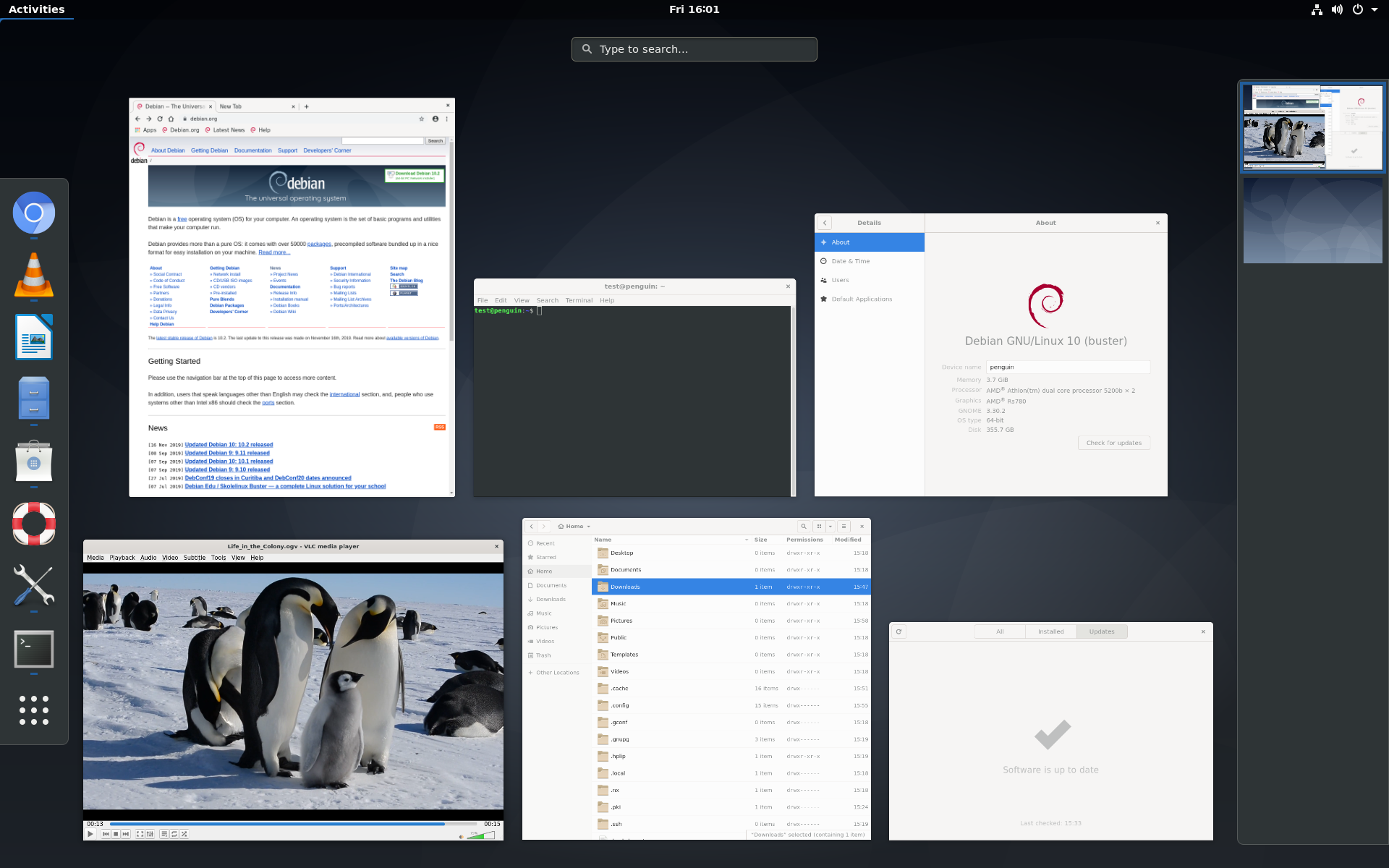
 Debian 4.0 (''Etch''), released 8 April 2007, contained around 18,000 packages maintained by more than 1,030 developers. Debian was ported to x86-64 (amd64) and support for the Motorola 68000 series (m68k) architecture was dropped. This version introduced utf-8 and udev device management by default.
Point releases:
*4.0r1 ()
*4.0r2 ()
*4.0r3 ()
*4.0r4 ()
*4.0r5 ()
*4.0r6 ()
*4.0r7 ()
*4.0r8 ()
*4.0r9 () this is the final update for codename Etch
Debian 4.0 (''Etch''), released 8 April 2007, contained around 18,000 packages maintained by more than 1,030 developers. Debian was ported to x86-64 (amd64) and support for the Motorola 68000 series (m68k) architecture was dropped. This version introduced utf-8 and udev device management by default.
Point releases:
*4.0r1 ()
*4.0r2 ()
*4.0r3 ()
*4.0r4 ()
*4.0r5 ()
*4.0r6 ()
*4.0r7 ()
*4.0r8 ()
*4.0r9 () this is the final update for codename Etch
 Debian 5.0 (''Lenny''), released 14 February 2009, contained more than 23,000 packages. Debian was ported to the ARM EABI (armel) architecture.
Point releases:
*5.0.1 ()
*5.0.2 ()
*5.0.3 ()
*5.0.4 ()
*5.0.5 ()
*5.0.6 ()
*5.0.7 ()
*5.0.8 ()
*5.0.9 ()
*5.0.10 () this is the final update for codename Lenny.
Debian 5.0 (''Lenny''), released 14 February 2009, contained more than 23,000 packages. Debian was ported to the ARM EABI (armel) architecture.
Point releases:
*5.0.1 ()
*5.0.2 ()
*5.0.3 ()
*5.0.4 ()
*5.0.5 ()
*5.0.6 ()
*5.0.7 ()
*5.0.8 ()
*5.0.9 ()
*5.0.10 () this is the final update for codename Lenny.
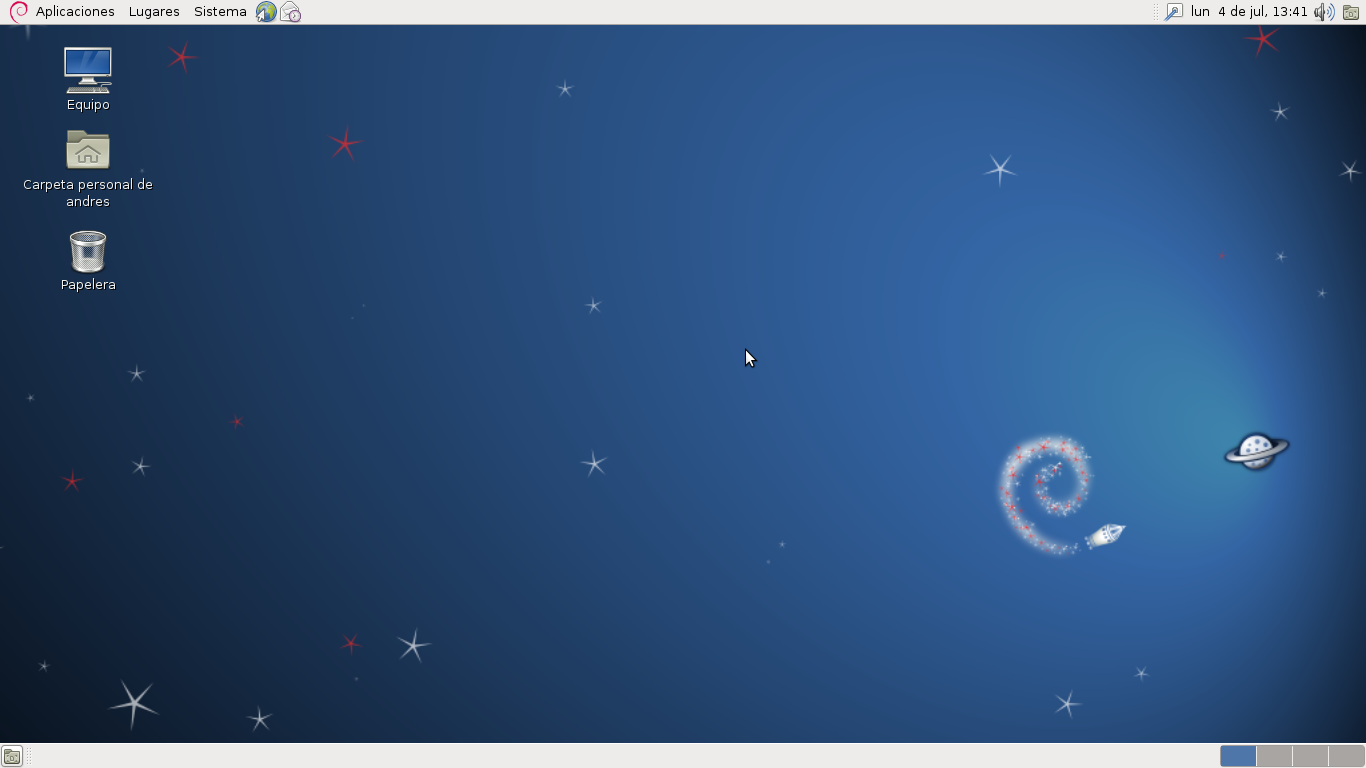 Debian 6.0 (''Squeeze''), released 6 February 2011, contained more than 29,000 packages. The default Linux kernel included was deblobbed beginning with this release. The web browser
Debian 6.0 (''Squeeze''), released 6 February 2011, contained more than 29,000 packages. The default Linux kernel included was deblobbed beginning with this release. The web browser
 Debian 7 (''Wheezy''), released 4 May 2013, contained more than 36,000 packages. Support for UEFI was added and Debian was ported to the armhf and IBM ESA/390 (s390x) architectures.
Point releases:
*7.1 ()
*7.2 ()
*7.3 ()
*7.4 ()
*7.5 ()
*7.6 ()
*7.7 ()
*7.8 ()
*Debian 8.0 codename Jessie releases, Wheezy becomes oldstable ()
*7.9 ()
*7.10 ()
*7.11 () this is the final update for codename Wheezy.
*Debian 9.0 codename Stretch releases, Wheezy becomes oldoldstable ()
*Wheezy long term support reached end-of-life ()
*Wheezy extended long term support reached end-of-life ().
Debian 7 (''Wheezy''), released 4 May 2013, contained more than 36,000 packages. Support for UEFI was added and Debian was ported to the armhf and IBM ESA/390 (s390x) architectures.
Point releases:
*7.1 ()
*7.2 ()
*7.3 ()
*7.4 ()
*7.5 ()
*7.6 ()
*7.7 ()
*7.8 ()
*Debian 8.0 codename Jessie releases, Wheezy becomes oldstable ()
*7.9 ()
*7.10 ()
*7.11 () this is the final update for codename Wheezy.
*Debian 9.0 codename Stretch releases, Wheezy becomes oldoldstable ()
*Wheezy long term support reached end-of-life ()
*Wheezy extended long term support reached end-of-life ().
 Debian 8 (''Jessie''), released 25 April 2015, contained more than 43,000 packages, with
Debian 8 (''Jessie''), released 25 April 2015, contained more than 43,000 packages, with
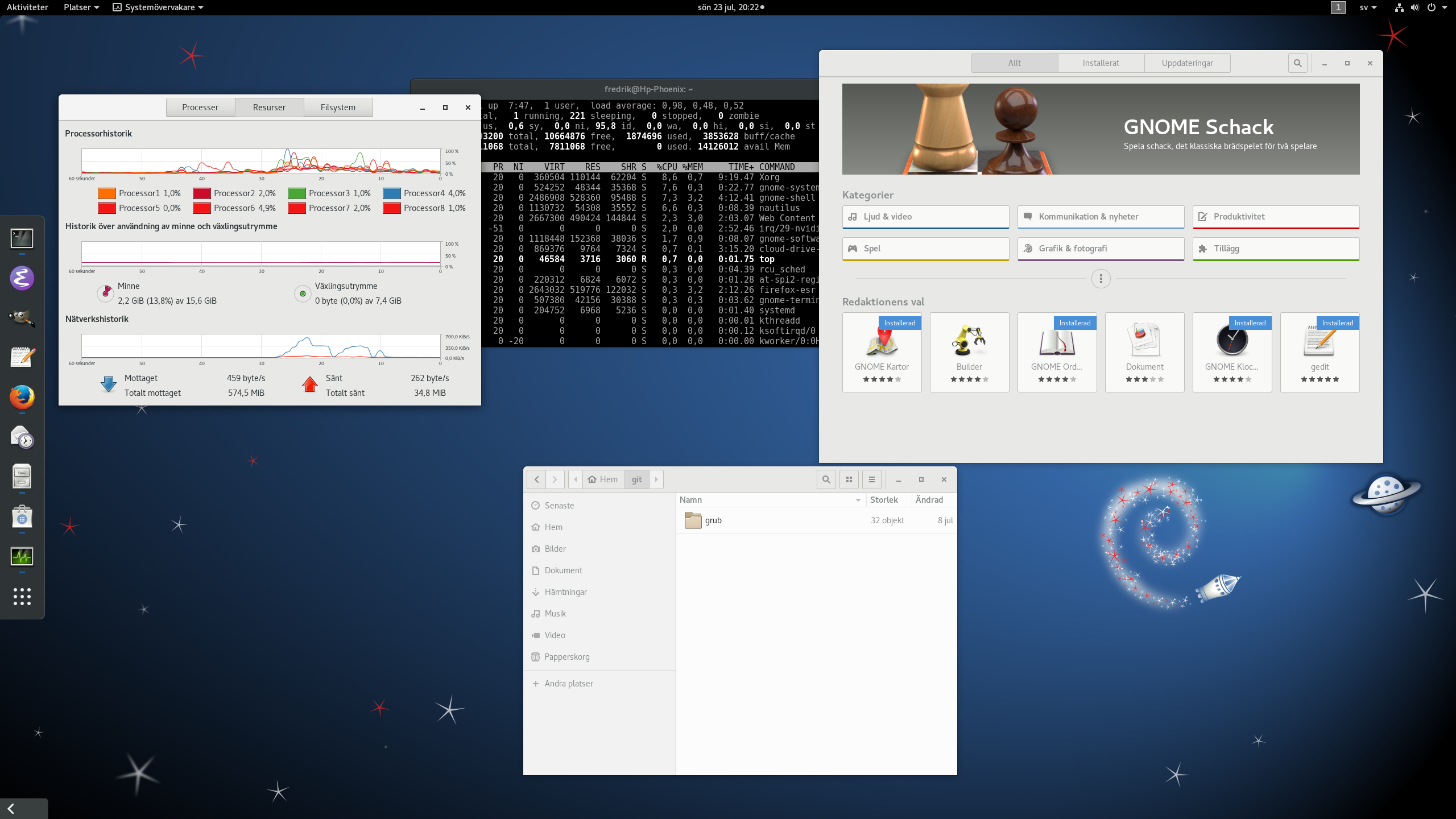 Debian 9 (Stretch) was released on 17 June 2017, two years and two months after Debian 8.0, and contained more than 51,000 packages. The final minor update, called a "point release", is version 9.13, released on . Major upgrades include the
Debian 9 (Stretch) was released on 17 June 2017, two years and two months after Debian 8.0, and contained more than 51,000 packages. The final minor update, called a "point release", is version 9.13, released on . Major upgrades include the
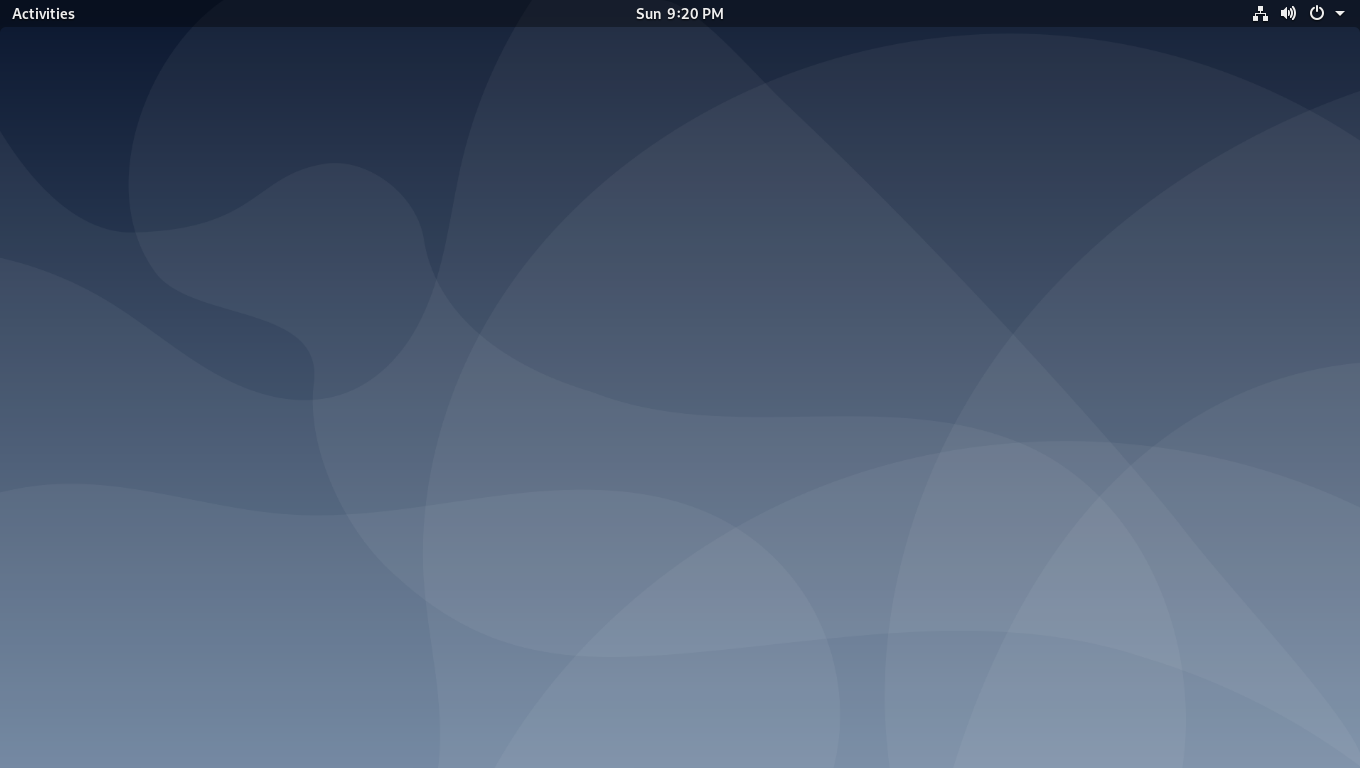 Debian 10 (Buster) was released on . It was two years and a month after Debian 9 (Stretch). Debian 10 contains 57,703 packages, supports UEFI Secure Boot, has AppArmor enabled by default, uses LUKS2 as the default LUKS format, and uses Wayland for GNOME by default.
Debian 10 ships with Linux kernel version 4.19. Available desktops include Cinnamon 3.8, GNOME 3.30, KDE Plasma 5.14, LXDE 0.99.2, LXQt 0.14, MATE 1.20, Xfce 4.12. Key application software includes LibreOffice 6.1 for office productivity, VLC 3.0 for media viewing, and
Debian 10 (Buster) was released on . It was two years and a month after Debian 9 (Stretch). Debian 10 contains 57,703 packages, supports UEFI Secure Boot, has AppArmor enabled by default, uses LUKS2 as the default LUKS format, and uses Wayland for GNOME by default.
Debian 10 ships with Linux kernel version 4.19. Available desktops include Cinnamon 3.8, GNOME 3.30, KDE Plasma 5.14, LXDE 0.99.2, LXQt 0.14, MATE 1.20, Xfce 4.12. Key application software includes LibreOffice 6.1 for office productivity, VLC 3.0 for media viewing, and
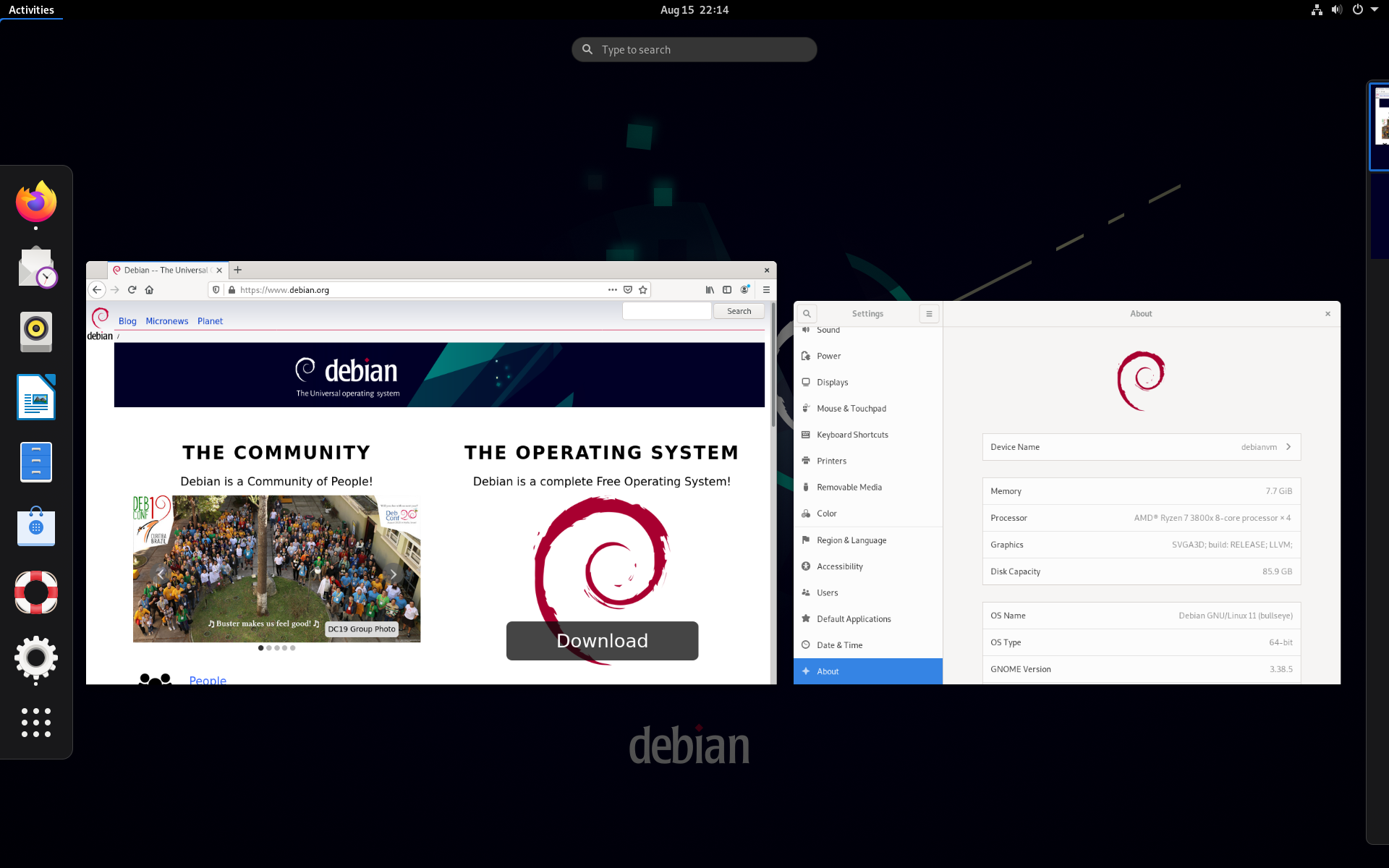 Debian 11 (Bullseye) was released on 14 August 2021. It is based on the Linux 5.10 LTS kernel and will be supported for five years.
On 12 November 2020, it was announced that "Homeworld", by Juliette Taka, will be the default theme for Debian 11, after winning a public poll held with eighteen choices.
Bullseye dropped the remaining Qt4/KDE 4 libraries and Python 2.
and shipped with Qt 5.15 KDE Plasma 5.20. Available desktops include Gnome 3.38, KDE Plasma 5.20, LXDE 11, LXQt 0.16, MATE 1.24, and Xfce 4.16.
Bullseye does not support the older big-endian 32-bit MIPS architectures. This is not to be confused with the more common i386 32-bit architecture which is still supported.
The first of the code freezes, readying Debian 11 for release, began on 12 January 2021.
Development freeze timetable:
* January 12, 2021: transition freeze
* February 12, 2021: soft freeze
* March 12, 2021: hard freeze
* July 17, 2021: full freeze
* August 14, 2021: release
Point releases:
*11.1 ()
*11.2 ()
*11.3 ()
*11.4 ()
*11.5 ()
*11.6 ()
Debian 11 (Bullseye) was released on 14 August 2021. It is based on the Linux 5.10 LTS kernel and will be supported for five years.
On 12 November 2020, it was announced that "Homeworld", by Juliette Taka, will be the default theme for Debian 11, after winning a public poll held with eighteen choices.
Bullseye dropped the remaining Qt4/KDE 4 libraries and Python 2.
and shipped with Qt 5.15 KDE Plasma 5.20. Available desktops include Gnome 3.38, KDE Plasma 5.20, LXDE 11, LXQt 0.16, MATE 1.24, and Xfce 4.16.
Bullseye does not support the older big-endian 32-bit MIPS architectures. This is not to be confused with the more common i386 32-bit architecture which is still supported.
The first of the code freezes, readying Debian 11 for release, began on 12 January 2021.
Development freeze timetable:
* January 12, 2021: transition freeze
* February 12, 2021: soft freeze
* March 12, 2021: hard freeze
* July 17, 2021: full freeze
* August 14, 2021: release
Point releases:
*11.1 ()
*11.2 ()
*11.3 ()
*11.4 ()
*11.5 ()
*11.6 ()
Debian Releases
at Debian Wiki
Debian Releases
at debian.org * {{Use dmy dates, date=September 2018 Debian Lists of operating systems Software version histories

Debian
Debian (), also known as Debian GNU/Linux, is a Linux distribution composed of free and open-source software, developed by the community-supported Debian Project, which was established by Ian Murdock on August 16, 1993. The first version of D ...
releases do not follow a fixed schedule. Recent releases have been made roughly biennially by the Debian Project. The most recent version of Debian is Debian version 11, codename "Bullseye". The next up and coming release of Debian is Debian 12 codename "Bookworm".
Debian always has at least three release branches active at any time: "stable", "testing" and "unstable". The stable release is the most recent and up-to-date version of Debian. The testing release contains packages that have been tested from unstable. Testing has significantly more up-to-date packages than stable and is a close version of the future release candidate for stable. The unstable release (also known as sid) is the release where active development takes place. It is the most volatile version of Debian.
When the Debian stable branch is replaced with a newer release, the current stable becomes an "oldstable" release. When the Debian stable branch is replaced again, the oldstable release becomes the "oldoldstable" release. Oldoldstable is eventually moved to the archived releases repository.
Naming convention
Debian distribution codenames are based on the names of characters from the '' Toy Story'' films. Debian's ''unstable''trunk
Trunk may refer to:
Biology
* Trunk (anatomy), synonym for torso
* Trunk (botany), a tree's central superstructure
* Trunk of corpus callosum, in neuroanatomy
* Elephant trunk, the proboscis of an elephant
Computing
* Trunk (software), in rev ...
is named after Sid, a character who regularly destroyed his toys.
Release history
Debian 1.0 was never released, as a vendor accidentally shipped a development release with that version number. The package management system dpkg and its front-end dselect were developed and implemented on Debian in a previous release. A transition from thea.out
a.out is a file format used in older versions of Unix-like computer operating systems for executables, object code, and, in later systems, shared libraries. This is an abbreviated form of "assembler output", the filename of the output of Ken Th ...
binary format to the ELF binary format had already begun before the planned 1.0 release. The only supported architecture was Intel 80386 (i386).
Debian 1.1 (Buzz)
Debian 1.1 (''Buzz''), released 17 June 1996, contained 474 packages. Debian had fully transitioned to the ELF binary format and used Linux kernel 2.0.Debian 1.2 (Rex)
Debian 1.2 (''Rex''), released 12 December 1996, contained 848 packages maintained by 120 developers.Debian 1.3 (Bo)
Debian 1.3 (''Bo''), released 5 June 1997, contained 974 packages maintained by 200 developers. Point releases: * 1.3.1 () * 1.3.1r1 (Release date unknown) * 1.3.1r2 (Release date unknown) * 1.3.1r3 (Release date unknown) * 1.3.1r4 (Release date unknown) * 1.3.1r5 (Release date unknown) * 1.3.1r6 ()Debian 2.0 (Hamm)
Debian 2.0 (''Hamm''), released 24 July 1998, contained over 1,500 packages maintained by over 400 developers. A transition was made to libc6 and Debian was ported to the Motorola 68000 series (m68k) architectures. Point releases: * 2.0r1 () * 2.0r2 () * 2.0r3 () * 2.0r4 () * 2.0r5 ()Debian 2.1 (Slink)
Debian 2.1 (''Slink''), released 9 March 1999, contained about 2,250 packages. The front-endAPT
Apt. is an abbreviation for apartment.
Apt may also refer to:
Places
* Apt Cathedral, a former cathedral, and national monument of France, in the town of Apt in Provence
* Apt, Vaucluse, a commune of the Vaucluse département of France
* A ...
was introduced for the package management system and Debian was ported to Alpha
Alpha (uppercase , lowercase ; grc, ἄλφα, ''álpha'', or ell, άλφα, álfa) is the first letter of the Greek alphabet. In the system of Greek numerals, it has a value of one. Alpha is derived from the Phoenician letter aleph , whic ...
and SPARC.
Point releases:
* 2.1r1 (Possibly never released)
* 2.1r2 ()
* 2.1r3 ()
* 2.1r4 ()
* 2.1r5 ()
Debian 2.2 (Potato)
Debian 2.2 (''Potato''), released 14–15 August 2000, contained 2,600 packages maintained by more than 450 developers. New packages included the display manager GDM, the directory service OpenLDAP, the security software OpenSSH and the mail transfer agent Postfix. Debian was ported to thePowerPC
PowerPC (with the backronym Performance Optimization With Enhanced RISC – Performance Computing, sometimes abbreviated as PPC) is a reduced instruction set computer (RISC) instruction set architecture (ISA) created by the 1991 Apple Inc., App ...
and ARM architectures.
Point releases:
* 2.2r1 ()
* 2.2r2 ()
* 2.2r3 ()
* 2.2r4 ()
* 2.2r5 ()
* 2.2r6 ()
* 2.2r7 ()
Debian 3.0 (Woody)
Debian 3.0 (''Woody''), released 19 July 2002, contained around 8,500 packages maintained by more than 900 developers. KDE was introduced and Debian was ported to the following architectures: IA-64, PA-RISC (hppa), mips and mipsel and IBM ESA/390 (s390). Point releases: * 3.0r1 () * 3.0r2 () * 3.0r3 () * 3.0r4 () * 3.0r5 () * 3.0r6 ()Debian 3.1 (Sarge)
Debian 3.1 (''Sarge''), released 6 June 2005, contained around 15,400 packages. debian-installer and OpenOffice.org were introduced. Point releases: * 3.1r1 () * 3.1r2 () * 3.1r3 () * 3.1r4 () * 3.1r5 () * 3.1r6 () * 3.1r7 () * 3.1r8 () this is the final update for codename Sarge.Debian 4.0 (Etch)
 Debian 4.0 (''Etch''), released 8 April 2007, contained around 18,000 packages maintained by more than 1,030 developers. Debian was ported to x86-64 (amd64) and support for the Motorola 68000 series (m68k) architecture was dropped. This version introduced utf-8 and udev device management by default.
Point releases:
*4.0r1 ()
*4.0r2 ()
*4.0r3 ()
*4.0r4 ()
*4.0r5 ()
*4.0r6 ()
*4.0r7 ()
*4.0r8 ()
*4.0r9 () this is the final update for codename Etch
Debian 4.0 (''Etch''), released 8 April 2007, contained around 18,000 packages maintained by more than 1,030 developers. Debian was ported to x86-64 (amd64) and support for the Motorola 68000 series (m68k) architecture was dropped. This version introduced utf-8 and udev device management by default.
Point releases:
*4.0r1 ()
*4.0r2 ()
*4.0r3 ()
*4.0r4 ()
*4.0r5 ()
*4.0r6 ()
*4.0r7 ()
*4.0r8 ()
*4.0r9 () this is the final update for codename Etch
Debian 5.0 (Lenny)
 Debian 5.0 (''Lenny''), released 14 February 2009, contained more than 23,000 packages. Debian was ported to the ARM EABI (armel) architecture.
Point releases:
*5.0.1 ()
*5.0.2 ()
*5.0.3 ()
*5.0.4 ()
*5.0.5 ()
*5.0.6 ()
*5.0.7 ()
*5.0.8 ()
*5.0.9 ()
*5.0.10 () this is the final update for codename Lenny.
Debian 5.0 (''Lenny''), released 14 February 2009, contained more than 23,000 packages. Debian was ported to the ARM EABI (armel) architecture.
Point releases:
*5.0.1 ()
*5.0.2 ()
*5.0.3 ()
*5.0.4 ()
*5.0.5 ()
*5.0.6 ()
*5.0.7 ()
*5.0.8 ()
*5.0.9 ()
*5.0.10 () this is the final update for codename Lenny.
Debian 6.0 (Squeeze)
 Debian 6.0 (''Squeeze''), released 6 February 2011, contained more than 29,000 packages. The default Linux kernel included was deblobbed beginning with this release. The web browser
Debian 6.0 (''Squeeze''), released 6 February 2011, contained more than 29,000 packages. The default Linux kernel included was deblobbed beginning with this release. The web browser Chromium
Chromium is a chemical element with the symbol Cr and atomic number 24. It is the first element in group 6. It is a steely-grey, lustrous, hard, and brittle transition metal.
Chromium metal is valued for its high corrosion resistance and hardne ...
was introduced and Debian was ported to the kfreebsd-i386 and kfreebsd-amd64 architectures (while that port was later discontinued), and support for the Intel 486, Alpha
Alpha (uppercase , lowercase ; grc, ἄλφα, ''álpha'', or ell, άλφα, álfa) is the first letter of the Greek alphabet. In the system of Greek numerals, it has a value of one. Alpha is derived from the Phoenician letter aleph , whic ...
, and PA-RISC (hppa) architectures was dropped.
Squeeze was the first release of Debian in which non-free firmware components (aka "binary blobs") were excluded from the "main" repository as a matter of policy.
Point releases:
*6.0.1 ()
*6.0.2 ()
*6.0.3 ()
*6.0.4 ()
*6.0.5 ()
*6.0.6 ()
*6.0.7 ()
*6.0.8 ()
*6.0.9 ()
*6.0.10 () this is the final update for codename Squeeze.
*Squeeze long term support reaches end-of-life ()
Debian 7 (Wheezy)
 Debian 7 (''Wheezy''), released 4 May 2013, contained more than 36,000 packages. Support for UEFI was added and Debian was ported to the armhf and IBM ESA/390 (s390x) architectures.
Point releases:
*7.1 ()
*7.2 ()
*7.3 ()
*7.4 ()
*7.5 ()
*7.6 ()
*7.7 ()
*7.8 ()
*Debian 8.0 codename Jessie releases, Wheezy becomes oldstable ()
*7.9 ()
*7.10 ()
*7.11 () this is the final update for codename Wheezy.
*Debian 9.0 codename Stretch releases, Wheezy becomes oldoldstable ()
*Wheezy long term support reached end-of-life ()
*Wheezy extended long term support reached end-of-life ().
Debian 7 (''Wheezy''), released 4 May 2013, contained more than 36,000 packages. Support for UEFI was added and Debian was ported to the armhf and IBM ESA/390 (s390x) architectures.
Point releases:
*7.1 ()
*7.2 ()
*7.3 ()
*7.4 ()
*7.5 ()
*7.6 ()
*7.7 ()
*7.8 ()
*Debian 8.0 codename Jessie releases, Wheezy becomes oldstable ()
*7.9 ()
*7.10 ()
*7.11 () this is the final update for codename Wheezy.
*Debian 9.0 codename Stretch releases, Wheezy becomes oldoldstable ()
*Wheezy long term support reached end-of-life ()
*Wheezy extended long term support reached end-of-life ().
Debian 8 (Jessie)
 Debian 8 (''Jessie''), released 25 April 2015, contained more than 43,000 packages, with
Debian 8 (''Jessie''), released 25 April 2015, contained more than 43,000 packages, with systemd
systemd is a software suite that provides an array of system components for Linux operating systems. Its main aim is to unify service configuration and behavior across Linux distributions; Its primary component is a "system and service manager ...
installed by default instead of init
In Unix-based computer operating systems, init (short for ''initialization'') is the first process started during booting of the computer system. Init is a daemon process that continues running until the system is shut down. It is the direct ...
. (sysvinit
In Unix-based computer operating systems, init (short for ''initialization'') is the first process started during booting of the computer system. Init is a daemon process that continues running until the system is shut down. It is the direct ...
and upstart packages are provided as alternatives.) Debian was ported to the ARM64 and ppc64le architectures, while support for the IA-64, kfreebsd-amd64 and kfreebsd-i386, IBM ESA/390 (s390) (only the 31-bit
In computer architecture, 31-bit integers, memory addresses, or other data units are those that are 31 bits wide.
In 1983, IBM introduced 31-bit addressing in the System/370-XA mainframe architecture as an upgrade to the 24-bit physical and vir ...
variant; the newer 64-bit s390x was retained) and SPARC architectures were dropped.
Long term support ended June 2020.
Point releases:
*8.1 ()
*8.2 ()
*8.3 ()
*8.4 ()
*8.5 ()
*8.6 ()
*8.7 ()
*8.8 ()
* Debian 9.0 codename Stretch releases, Jessie becomes oldstable ()
*8.9 ()
*8.10 ()
*Regular security support updates have been discontinued ()
*8.11 () this is the final update for codename Jessie.
*Debian 10.0 codename Buster releases, Jessie becomes oldoldstable ()
*Jessie long term support reaches end-of-life ()
*Jessie extended long term support reaches end-of-life ()
Debian 9 (Stretch)
 Debian 9 (Stretch) was released on 17 June 2017, two years and two months after Debian 8.0, and contained more than 51,000 packages. The final minor update, called a "point release", is version 9.13, released on . Major upgrades include the
Debian 9 (Stretch) was released on 17 June 2017, two years and two months after Debian 8.0, and contained more than 51,000 packages. The final minor update, called a "point release", is version 9.13, released on . Major upgrades include the Linux kernel
The Linux kernel is a free and open-source, monolithic, modular, multitasking, Unix-like operating system kernel. It was originally authored in 1991 by Linus Torvalds for his i386-based PC, and it was soon adopted as the kernel for the GNU ope ...
going from version 3.16 to 4.9, GNOME
A gnome is a mythological creature and diminutive spirit in Renaissance magic and alchemy, first introduced by Paracelsus in the 16th century and later adopted by more recent authors including those of modern fantasy literature. Its characte ...
desktop version going from 3.14 to 3.22, KDE Plasma 4 was upgraded to Plasma 5, LibreOffice 4.3 upgraded to 5.2 and Qt upgraded from 4.8 to 5.7. LXQt has been added as well.
The Intel i586 (Pentium), i586/i686 hybrid and PowerPC
PowerPC (with the backronym Performance Optimization With Enhanced RISC – Performance Computing, sometimes abbreviated as PPC) is a reduced instruction set computer (RISC) instruction set architecture (ISA) created by the 1991 Apple Inc., App ...
architectures are no longer supported as of Stretch.
Point releases:
*9.1 ()
*9.2 ()
*9.3 ()
*9.4 ()
*9.5 ()
*9.6 ()
*9.7 ()
*9.8 ()
*9.9 ()
*Stretch becomes oldstable, Buster becomes stable release ()
*9.10 ()
*9.11 ()
*9.12 ()
*9.13 () this is the final update for codename Stretch.
*Stretch long term support reaches end-of-life ()
*Stretch extended long term support reaches end-of-life ()
Debian 10 (Buster)
 Debian 10 (Buster) was released on . It was two years and a month after Debian 9 (Stretch). Debian 10 contains 57,703 packages, supports UEFI Secure Boot, has AppArmor enabled by default, uses LUKS2 as the default LUKS format, and uses Wayland for GNOME by default.
Debian 10 ships with Linux kernel version 4.19. Available desktops include Cinnamon 3.8, GNOME 3.30, KDE Plasma 5.14, LXDE 0.99.2, LXQt 0.14, MATE 1.20, Xfce 4.12. Key application software includes LibreOffice 6.1 for office productivity, VLC 3.0 for media viewing, and
Debian 10 (Buster) was released on . It was two years and a month after Debian 9 (Stretch). Debian 10 contains 57,703 packages, supports UEFI Secure Boot, has AppArmor enabled by default, uses LUKS2 as the default LUKS format, and uses Wayland for GNOME by default.
Debian 10 ships with Linux kernel version 4.19. Available desktops include Cinnamon 3.8, GNOME 3.30, KDE Plasma 5.14, LXDE 0.99.2, LXQt 0.14, MATE 1.20, Xfce 4.12. Key application software includes LibreOffice 6.1 for office productivity, VLC 3.0 for media viewing, and Firefox ESR
Mozilla Firefox, or simply Firefox, is a free and open-source web browser developed by the Mozilla Foundation and its subsidiary, the Mozilla Corporation. It uses the Gecko rendering engine to display web pages, which implements current and ...
for web browsing.
Point releases:
*10.1 ()
*10.2 ()
*10.3 ()
*10.4 ()
*10.5 ()
*10.6 ()
*10.7 ()
*10.8 ()
*10.9 ()
*10.10 ()
*Buster becomes oldstable, Bullseye is the current stable release ()
*10.11 ()
*10.12 ()
*10.13 () this is the final update for codename Buster
*
Debian 11 (Bullseye)
 Debian 11 (Bullseye) was released on 14 August 2021. It is based on the Linux 5.10 LTS kernel and will be supported for five years.
On 12 November 2020, it was announced that "Homeworld", by Juliette Taka, will be the default theme for Debian 11, after winning a public poll held with eighteen choices.
Bullseye dropped the remaining Qt4/KDE 4 libraries and Python 2.
and shipped with Qt 5.15 KDE Plasma 5.20. Available desktops include Gnome 3.38, KDE Plasma 5.20, LXDE 11, LXQt 0.16, MATE 1.24, and Xfce 4.16.
Bullseye does not support the older big-endian 32-bit MIPS architectures. This is not to be confused with the more common i386 32-bit architecture which is still supported.
The first of the code freezes, readying Debian 11 for release, began on 12 January 2021.
Development freeze timetable:
* January 12, 2021: transition freeze
* February 12, 2021: soft freeze
* March 12, 2021: hard freeze
* July 17, 2021: full freeze
* August 14, 2021: release
Point releases:
*11.1 ()
*11.2 ()
*11.3 ()
*11.4 ()
*11.5 ()
*11.6 ()
Debian 11 (Bullseye) was released on 14 August 2021. It is based on the Linux 5.10 LTS kernel and will be supported for five years.
On 12 November 2020, it was announced that "Homeworld", by Juliette Taka, will be the default theme for Debian 11, after winning a public poll held with eighteen choices.
Bullseye dropped the remaining Qt4/KDE 4 libraries and Python 2.
and shipped with Qt 5.15 KDE Plasma 5.20. Available desktops include Gnome 3.38, KDE Plasma 5.20, LXDE 11, LXQt 0.16, MATE 1.24, and Xfce 4.16.
Bullseye does not support the older big-endian 32-bit MIPS architectures. This is not to be confused with the more common i386 32-bit architecture which is still supported.
The first of the code freezes, readying Debian 11 for release, began on 12 January 2021.
Development freeze timetable:
* January 12, 2021: transition freeze
* February 12, 2021: soft freeze
* March 12, 2021: hard freeze
* July 17, 2021: full freeze
* August 14, 2021: release
Point releases:
*11.1 ()
*11.2 ()
*11.3 ()
*11.4 ()
*11.5 ()
*11.6 ()
Debian 12 (Bookworm)
Debian 12 (Bookworm) is the current testing release of Debian and is the next release candidate for Debian. Debian 12 is expected to have link-time optimization (LTO) enabled by default. Debian 12 might reduce focus on i386 support, though this has yet to be determined.Release table
When a release transitions to long-term support phase (LTS-phase), security is no longer handled by the main Debian security team. Only a subset of Debian architectures are eligible for Long Term Support, and there is no support for packages in backports.Release timeline
Port timeline
Many of past architectures, plus some that have not yet achieved release status, are available from the ''debian-ports'' repository.See also
* Summary of Debian version history * Ubuntu version history *Linux Mint version history
Linux Mint is a community-driven Linux distribution based on Ubuntu (which is in turn based on Debian), bundled with a variety of free and open-source applications. It can provide full out-of-the-box multimedia support for those who choose to i ...
References
External links
Debian Releases
at Debian Wiki
Debian Releases
at debian.org * {{Use dmy dates, date=September 2018 Debian Lists of operating systems Software version histories